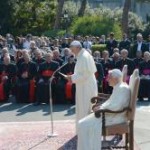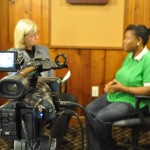“I want to live in a society where strong relationships are plentiful and filled with real, authentic love; a love that isn’t afraid of hardship or ugliness, that doesn’t give up when it’s convenient to,” Jose Mena tells me as we discuss twenty-somethings today and the Catholic Church — occasioned by so many things in the news and the reflective moment provided by the ongoing Fortnight for Freedom.
“I want to live in a society where inter-generational relationships are strengthened and preserved; where I’ll sacrifice just as much for my parents as they’ve sacrificed for me,” he says.
“I want to be able to be a model of that kind of love to my grandchildren, and to show them the peace to be found in it,” he continues.
Jose, who is part of the Catholic Voices USA family, has hope about the future as his is in Christ. In our interview, he expresses his prayer that we better communicate “the awesome splendor of the totality of God’s love for us.” Concerned about “an increasingly prevalent perception that religious convictions are for the pews rather than the public square,” he’s trying to live something different -– freedom in surrender to his Christian call. We talk more, below.
Q. You graduated from Princeton. What is it about being unaffiliated religiously that is seems so attractive to young people? How can the Catholic Church better communicate with them?
A: I think there’s an impression that the Catholic Church — and religion more broadly — just doesn’t have a whole lot to contribute to young people’s lives these days.
Ultimately, I think a lot of the criticisms and suspicions of the Church can be rectified by better education and understanding of what we actually believe in and why we believe it. I get the sense that most folks — even highly educated ones — don’t thoroughly understand how the philosophical differences between various Christian denominations came about or what they consist of. Instead, the perception seems to be that there’s a very broad “Christianity” that’s roughly the Apostle’s Creed mixed with “traditional morality.” This is problematic when we start talking about flashpoint moral issues, where because of this supposed homogeneity across “Christianity” the Catholic is placed in the same boat as the Westboro Baptist Church picketers. So I think that the Church needs to reassert what makes Catholicism unique and different — emphasizing its artistic and philosophical heritage and expounding on the lives of the saints is a great place to start — while continuing to bring us together in ecumenical dialogue.
There are also the dueling impressions that Catholics or either just another political constituency or, alternatively — as we watch politicians who profess to be Catholic defend abortion in the public square — that our beliefs are optional. It’s my hope my generation will lead with Catholic social teaching, infusing all of politics with a deference to the dignity of human life in all its stages.
I think there’s a lot of potential for breaking out of these “monolithic Christian” and “purely partisan” categories — it’s already there in the social teaching.
We Catholics need to recapture the moral/emotional center of American life. I don’t think it really matters what kinds of political or philosophical arguments we can use to defend Catholic principles and ideas if we don’t have a story that resonates with people. I think that primarily artistic forms lead the way here — narrative, music, visual art — that connect people emotionally to the glory of God. It strikes me that the most effective forms of political discourse aren’t so much theoretical, abstract arguments but compelling vignettes designed to strike at people’s emotions. And I think that young people tend to end up with a truncated version of Catholicism that doesn’t reflect the incredible beauty of our faith. Expressing the reality of sin, the Fall, and redemption in Christ in compelling ways that do justice to the awesome splendor of the totality of God’s love for us has to be the number one priority.
Q. Marriage is at the top of the news lately. What appeals to you most about Church teaching on marriage?
A: What appeals to me most about the Catholic idea of marriage is how comprehensive its vision of love is. It teaches of a love that never falters or wavers, no matter the circumstance. It teaches of a love that is completely self-giving, that doesn’t hold anything back for “I” or “me.” It teaches a love that respects the awesome power to create new human life and that revels in the joys of raising new generations to adulthood. It teaches a love that asks us to pour every last drop of ourselves into actively willing the good not just for your partner but for the union created between you.
It’s a love, in short, that intimately reflects Christ’s love for us. I’m tremendously blessed to take part in it.
Q: How can we better share that message and support marriage?
A: One of the biggest stumbling blocks with the Church’s witness to marriage is simple to point out — Catholics in general are doing an incredibly poor job of actually living out what the Church teaches about marriage. It’s never been trivial to live a saintly life, but now more than ever, we need married Catholics who are dedicated to living up to the admittedly high bar Jesus sets for us. Without this witness, we’re unable to make a compelling case to the rest of society about precisely why the political departures from the kind of vision of marriage we present aren’t the best of ideas.
This isn’t a new problem — it’s another manifestation of the historical mandates of the Church to evangelize nonbelievers and inspire a deeper commitment among believers. American society has never done a particularly good job of consistently and comprehensively adhering to Catholic ideals about marriage either in law or in practice. So I think it comes down to re-committing ourselves to real outreach in our communities while striving as hard as we can to live as saints in our own lives, just like it always has.
Q. Why are you Catholic, fundamentally? And why are you happy about it?
A: I think that Catholicism both in its witness to the truths of the Bible and the tradition of the Doctors and Fathers of the Church makes the most comprehensive and coherent intellectual account of who humans are and how we’re situated in the created universe. This enables an idea of love both in theory and — more importantly — in practice that’s unlike anything else I’ve encountered. To truly give yourself over to that love — to live a saintly life — is the highest happiness conceivable.
All of that, of course, means very little without the reality of Jesus Christ’s life and death. It’s that astonishing, inconceivable, wonderful event that makes me so deeply happy to be Catholic.
Q. Have you been watching Pope Francis? What do you think?
A: I’m very excited about him. He is personable and humble, a man dedicated to showing rather than telling, a man whose ebullience makes his dedication to God immediately obvious to everyone watching him.
Q. What gives you hope about the future?
A: It’s hard to believe sometimes that I can actually live a saintly life, because I know that I can’t on my own. I’m relying on grace to get there, and I’m hopeful that grace can work changes in me to help me to live more deeply in Christ’s love.
Right now my generation’s caught in a tough moment of mass unemployment, crumbling civil society and a lack of confidence in elected leadership. It’s a bleak picture, to be sure, but I’m confident that we can move our society back toward a more just, more humane and more loving place. That’s what the Church is nudging us to do, and I’m confident that if we apply the Church’s teaching we can solve a lot of the problems we’re facing today.












